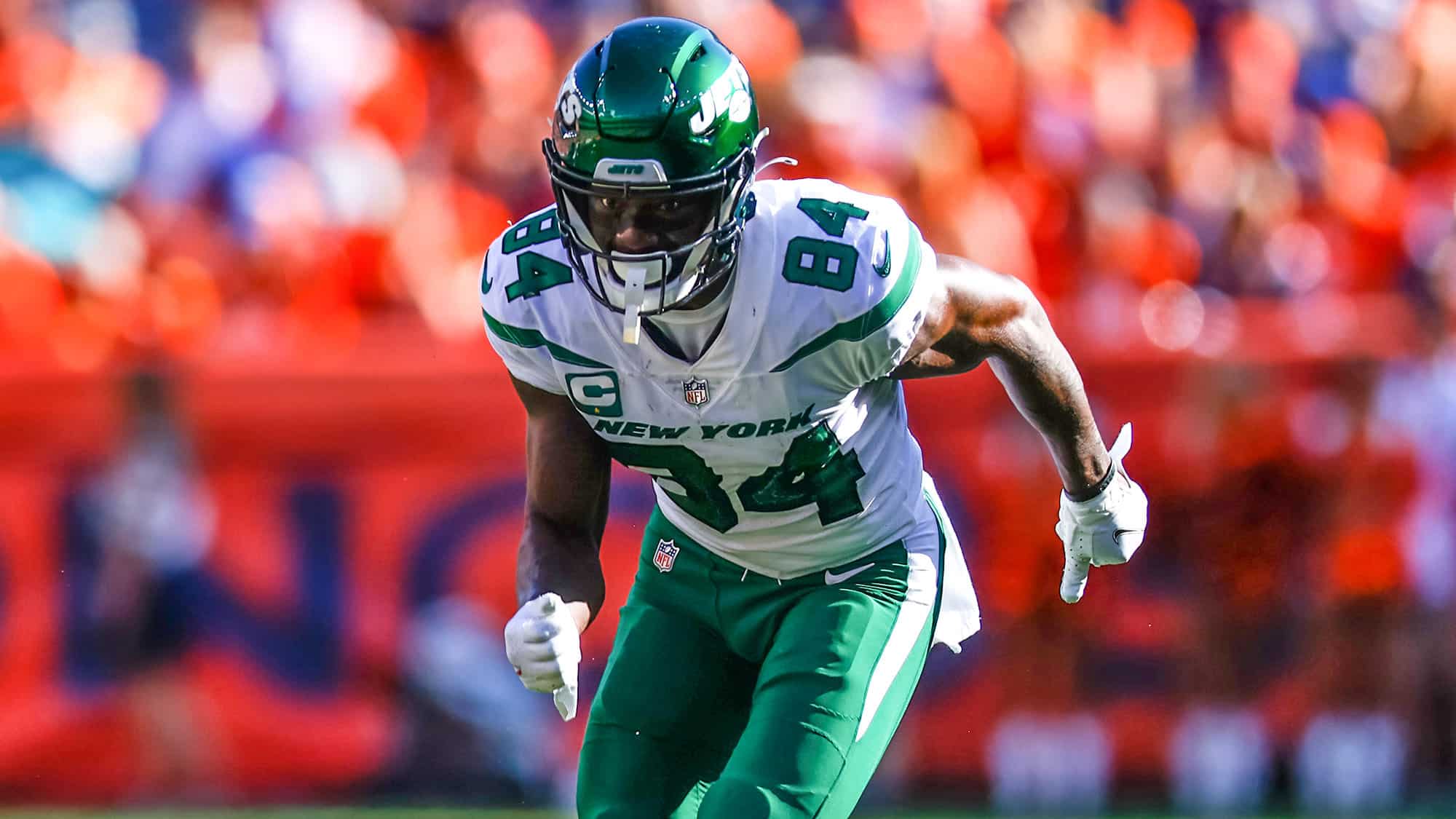Corey Davis
Corey Davis started his New York Jets career off with a bang. In the season opener, Davis caught five of seven targets for 97 yards and two touchdowns. He showed the versatile skill-set that the Jets signed him to provide, doing damage with his contested-catch ability, after-the-catch elusiveness, and intermediate route-running.
Since then, Davis has seemingly had his talent stolen by the aliens from Space Jam.
Against the Patriots and Broncos, Davis caught seven of 15 targets for just 49 yards and zero touchdowns. His average of 3.3 yards per target over that span ranked as the worst in the NFL among the 60 wide receivers with at least 10 targets from Weeks 2-3.
Pro Football Focus has credited Davis with three drops this season. He is already one drop away from his career-high of four.
One of Davis’ most appealing skills coming into New York was his prowess on contested catches. From 2018-20, Davis caught 62.5% of his contested targets, according to PFF, which ranked fifth-best among qualified wide receivers over that span.
That trait made Davis an appealing fit alongside Zach Wilson, who is known for giving his receivers plenty of chances to make plays in contested situations.
Davis has caught just two of his six contested targets thus far this season (33.3%). That includes a 1-for-5 performance in Denver.
We’re only three games in, but Davis will begin to head down the path of becoming a massive free-agent disappointment if his issues over the past two games persist. His woes are especially damaging for the fate of this franchise since his performance directly impacts the development of the most important piece in the organization, Wilson.
Get Started: Learn More About Becoming A Jet X Member
Marcus Maye
Robert Saleh and Jeff Ulbrich moved Marcus Maye back down to the strong safety position despite him clearly establishing in 2020 that he is better at free safety. Unsurprisingly, he has not lived up to his usual high standards.
Maye leads the Jets with four missed tackles this season, according to PFF.
In coverage, Maye has allowed seven of 10 targets to be completed for 74 yards and four first downs. One of the three incompletions would have been a first down but was dropped by Panthers wideout Terrace Marshall. Maye has also given up two first downs via penalty.
Maye is currently yielding a career-high of 24.7 yards per game through the air. That’s more than double his career average entering the season (11.8).
Including Weeks 1-5 of the 2020 season, Maye has now posted an overall Pro Football Focus grade above the 2020 positional average (64.1) in only two of his eight games as a starter at the strong safety position. He surpassed that mark in eight of his 11 games at free safety in 2020.
Maye certainly hasn’t been terrible, though. He’s just been erratic, as he has balanced out his bevy of mistakes with a high number of plays near the line of scrimmage. His total of seven tackles that held the ball carrier to a gain of two yards or less is tied for second among safeties, trailing only former comrade Jamal Adams (9).
I see Maye as an average player at strong safety, which is a steep drop from the top 5-10 level he has proven capable of at free safety.
When playing free safety, Maye is a good last line of defense who does not botch many assignments and still makes plenty of plays. As a strong safety, he continues to make a lot of plays, but the mistakes pile up. He doesn’t take the best angles in pursuit as a box player, leading to missed tackles, and he is more exploitable in coverage.
The Jets will be without Maye for 3-to-4 weeks as he nurses an ankle injury. His agent appears to hope that a trade is on the horizon.
A team in need of a deep safety would be wise to target Maye. Teams in need of someone to roam the box should probably refrain from overpaying.
Tyler Kroft
Tyler Kroft plays an integral role in the Jets’ offense. He ranks 10th on the offense with 40.3 snaps per game (63% of snaps) and has been the primary tight end in a scheme that relies heavily on its tight ends to spark the run game.
Kroft has established himself as an above-average blocker throughout his career, but the Jets have not seen anything close to that so far. He has been a liability as a blocker, consistently failing to seal the edge.
At PFF, Kroft has a run-blocking grade of 46.3, which ranks 71st out of 79 qualified tight ends.
Kroft is hurting the Jets in the passing game, too.
While he is no Travis Kelce, Kroft has shown flashes of being at least a respectable pass-catcher throughout his career, but he has not even met his own standards as a receiver. Kroft is averaging career-lows in yards per route run (0.71), yards per reception (7.7), air yards per reception (4.2), and percentage of targets resulting in a conversion (22.2%).
Kroft has also struggled in pass protection, giving up two pressures over just 14 pass-blocking snaps while contributing to multiple other blocking miscommunications. His 43.8 pass-blocking grade at PFF is a far cry from the 79.1 mark he had in Buffalo last season.
If Kroft can climb back up to his career norms, it would be a substantial boon for the Jets’ offense.

